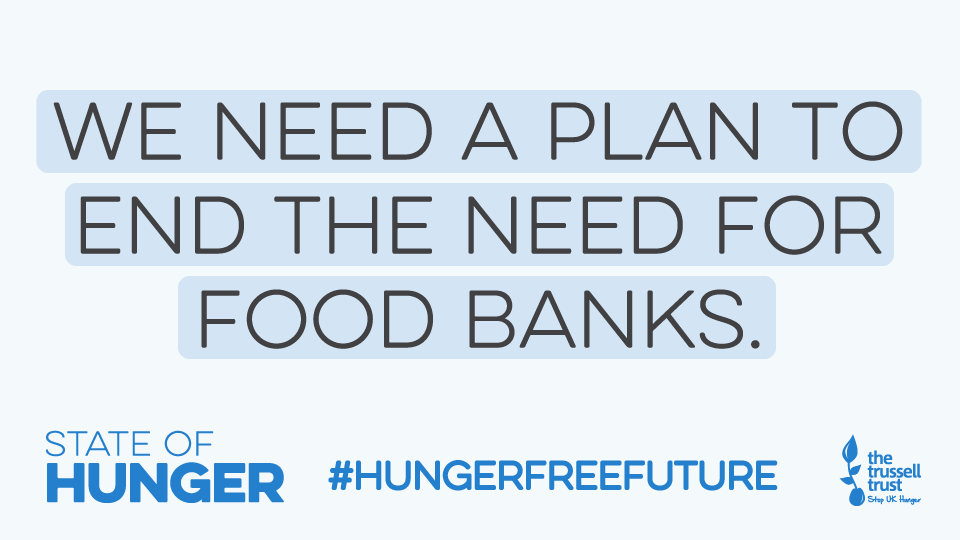By Tom Weekes, Research Manager
The Trussell Trust is calling for government at all levels to develop a plan for ending the need for food banks. Our State of Hunger research shows that the clearest place to start is ensuring that people have enough income to support themselves. Significant changes to our social security system are needed to ensure we all have a strong enough lifeline when we face hard times.
This blog explores the relationship between social security and need for food banks. The State of Hunger shows consistent evidence that the design of the social security system, and particularly the level of support that people receive is a key reason for why people need support from food banks. From applying to receiving support, the design of the system puts people at risk of hardship.
Applying and receiving benefits can be challenging and pushes people into hardship
Applications for Universal Credit (UC) must be online, a challenging experience for people experiencing destitution with limited digital access. This is compounded by an application process that can often feel arduous and confrontational. For people who have experienced challenging life events, who are disabled, or have mental health problems these may be barriers that cannot be overcome without help and the delay in applying can push people further into hardship.
Some people may not have the option of applying for social security. Many people in the UK live with ‘no recourse to public funds’ (NRPF) meaning they cannot receive public financial support. This problem has been particularly exposed during pandemic. In early 2020 2% of people referred to food banks were estimated to have NRPF status, which increased to 11% after March 2020.
Concerns around eligibility are also mirrored for people trying to apply for disability benefits such as Personal Independence Payments (PIP). The lack of support for disabled people, who may have significant additional costs related to their disability but do not meet the demanding criteria for PIP, is a significant driver of need.
If you have overcome these barriers and are able to successfully claim support you face a five week wait for payment, which in practice is often longer. This forces people to choose between experiencing hardship during these weeks or taking on an advance payment which then has to be repaid at a later stage.
The level of support from social security is too low to protect people from hardship
The State of Hunger highlights the very low level of social security payments as a significant driver of need for food banks. Research has shown that the UC standard allowance and other income replacement benefits provide only a third of the income necessary for a minimum socially acceptable standard of living, as measured by the ‘Minimum Income Standard’.
Other benefits are also not sufficient to meet costs. People who are privately renting in receipt of social security receive additional support which is meant to cover their housing costs. However, the report shows that the amount received is often not enough, meaning people have to dig into their subsistence benefits (which are already too low to support a minimum standard) to keep a roof over their heads.
People in receipt of social security often do not receive everything they are entitled to because of deductions from the government
People in receipt of social security often find these limited payments reduced even further.
People who took on an advance payment to tide them over during the wait for UC face long term reductions to the amount of income they receive to pay this back. This is common amongst people needing support from food banks. Between early and mid-2020, the DWP became the most common lender to people referred to food banks in the Trussell Trust network with almost half (47%) saying they owed money to the DWP and 73% of people referred in receipt of UC were repaying an advance.
Other design features reducing support include the ‘bedroom tax’ which reduces the amount of housing support people receive if they are socially renting and have a room in which someone does not permanently reside. 17% of social renters were paying this in early 2020.
Our social security system can keep families afloat. But the evidence from State of Hunger is clear: the flaws in its design mean our social security system is not protecting people from harm, and is instead driving people to food banks.
As we look to rebuild our society, we need to see the government develop a plan to end the need for food banks. This plan should include:
- Ensuring everyone has enough to afford the essentials – starting with keeping the £20 increase to Universal Credit and extending this to legacy benefits, so we can reach all families who need this lifeline.
- Ensuring local lifelines are available to get people the right support at the right time – investing in and improving coordination of local support, such as local welfare assistance schemes.
- Involving food banks and people with lived experience and adopting a cross-government approach.





